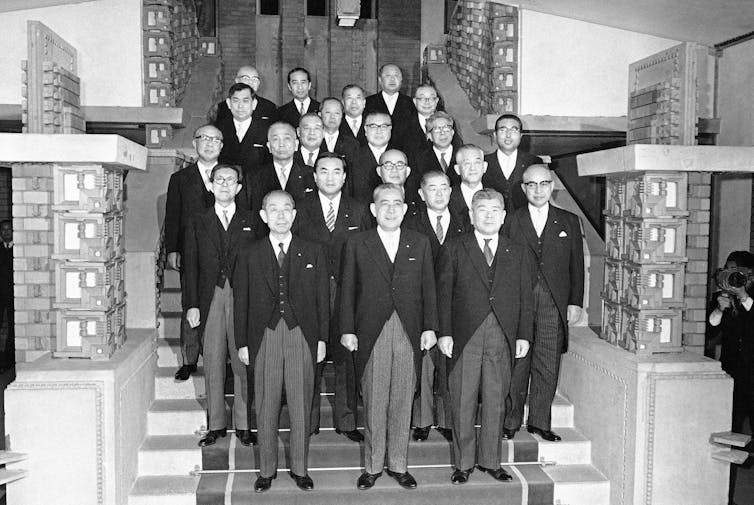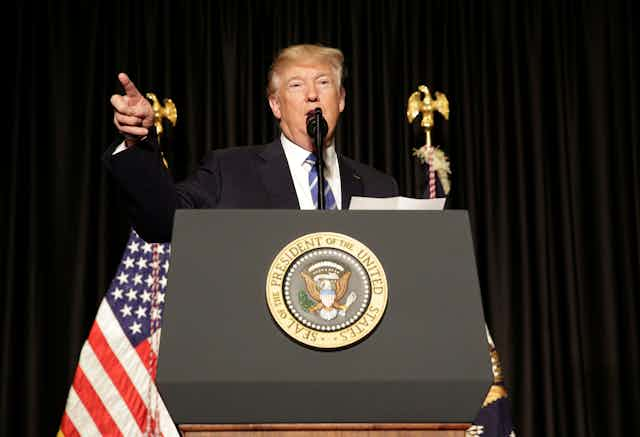Like most Republicans, President Donald Trump has made it clear he intends to “fix” the federal government by “draining the swamp.” Traditionally, the GOP has aimed to cut the size of the federal government. The president’s freeze on hiring federal employees is a first step in that direction. And he might go a step more.
The administration is showing signs that it views the bureaucracy as primarily implementers, not creators, of policy.
Evidence of this shift in approach can be seen in White House Press Secretary Sean Spicer’s response to a letter of dissent signed by nearly 1,000 State Department employees against Trump’s travel ban to the U.S. from seven Muslim majority countries. He said they should “either get with the program or they can go.”
Trump abruptly ended Sally Yates’ term as attorney general for refusing to defend the order.
This demand for obedience is most often seen in competitive authoritarian regimes, which I study. Such regimes often look like democracies, but don’t actually function like them. Think Turkey and Malaysia, for example.
Such a confrontation between leaders and civil servants leaves the system gridlocked and in chaos. It’s worth understanding the vital role bureaucracies play in the smooth functioning of a government by looking at examples from other countries.
Lessons from Japan and Turkey
After the second World War, Japan made efforts to rebuild its economy and revamp its pre-war institutions. Leaders sought to better serve a new democratic country with significantly limited global influence. Civil service reform was a crucial part of this rebuilding process. As a result of these reforms, starting in the 1960s, Japan was effectively governed by a bureaucracy, while the Liberal Democratic Party ruled.

Prime Minister Eisaku Sato, who was in power most of the ‘60’s and early '70’s, empowered bureaucrats at government departments. For example, under his leadership, the responsibilities of the Ministry of International Trade and Industry were expanded to include building an export-oriented economy that created jobs. This work built the foundations for the modern Japanese economy.
Politicians were able to take credit for economic programs that worked, and distance themselves from those that were unpopular, but necessary. The LDP deflected criticism of unpopular budget cuts, and the restructuring of basic public services implemented by the Ministry of International Trade and Industry.
This division of responsibility allowed nonelected officials to conduct the day-to-day tasks of governing and delivering public services. Meanwhile, party leaders focused on the big-ticket populist items, such as resisting China’s acceptance into the U.N., and committing to a nonnuclear Japan. This allowed the regime to focus on promises that helped win reelection. Civil servants had the autonomy to run their departments in the most efficient way without political blow-back.
The case of Turkey is more complex. It also went through a similar period during the 1980s in which its government – both in authoritarian and democratic forms – relied on the bureaucracy to lead industrialization and development efforts.
In the late '70’s, Turkey was on the verge of civil war triggered by economic collapse. Democratic government led by Suleyman Demeril unsuccessfully tried to launch a last ditch series of economic reforms which left Turkey unable to buy even the basic commodities. At risk of complete economic breakdown, General Kenan Evren seized power and put in place an authoritarian regime to rule Turkey in 1980.
The new regime pushed a series of sweeping changes, including banning unions, controlling wages, banning political parties and removing agricultural subsidies. The push for industrialization was the cornerstone of this strategy. What the regime failed to do was effectively implement the strategy and trust state institutions to do their work. The policies had little input from the bureaucrats who expected to implement them. As a result, real wages were depressed and farming communities suffered losses without subsidies.
In state-sanctioned elections of 1983, Turgat Ozal was elected as prime minister against President Evren’s preferred candidates. Ozal was able to roll back the harsh economic policies and actively push for industrialization. He was able to bring back the professionalization of the bureaucracy by giving them a larger role in policy creation and implementation. Buoyed by the new mediator, newly independent government institutions pushed austerity measures that cut government spending and incentivized foreign investment. Heavy government subsidies for large industries in new economic opportunity zones stabilized and spurred growth in Turkey’s economy.
Meanwhile President Evren, who had advocated against this approach to governance approach between 1980 and 1983, seemed to be ready to take credit for it by the time 1987 rolled around.
The common pattern observed in the cases of Turkey and Japan is the government’s reliance on an independent civil service, especially in times of political turmoil.
Ruling and governing: Marriage of convenience?
The new administration in the U.S. is challenging the autonomy of the civil service by limiting its role in policy creation and implementation. Trump’s election mandate, with significant support from Congress, is to “change things up” in Washington and push for stable economic growth. To achieve this, the administration will need to find a way to work with the civil service and allow it to do its job, not impede it.
Like in Turkey and Japan, the bureaucracy evolves in times of political change. Especially in times of severe political partisanship, reliance on bureaucracy to deliver on campaign promises increases. Trump’s administration needs the technical policy making expertise of bureaucrats to deliver on those promises.
But what is becoming increasingly clear with the inefficient rollout of Trump’s travel ban is that his administration may lack willingness to work with relevant bureaucrats to implement its vision.
If the administration continues down this path, we may witness more botched implementation of orders like the travel ban. The quicker the administration reformulates its strategy to work with civil servants, the faster we can expect meaningful policies and their implementation.

